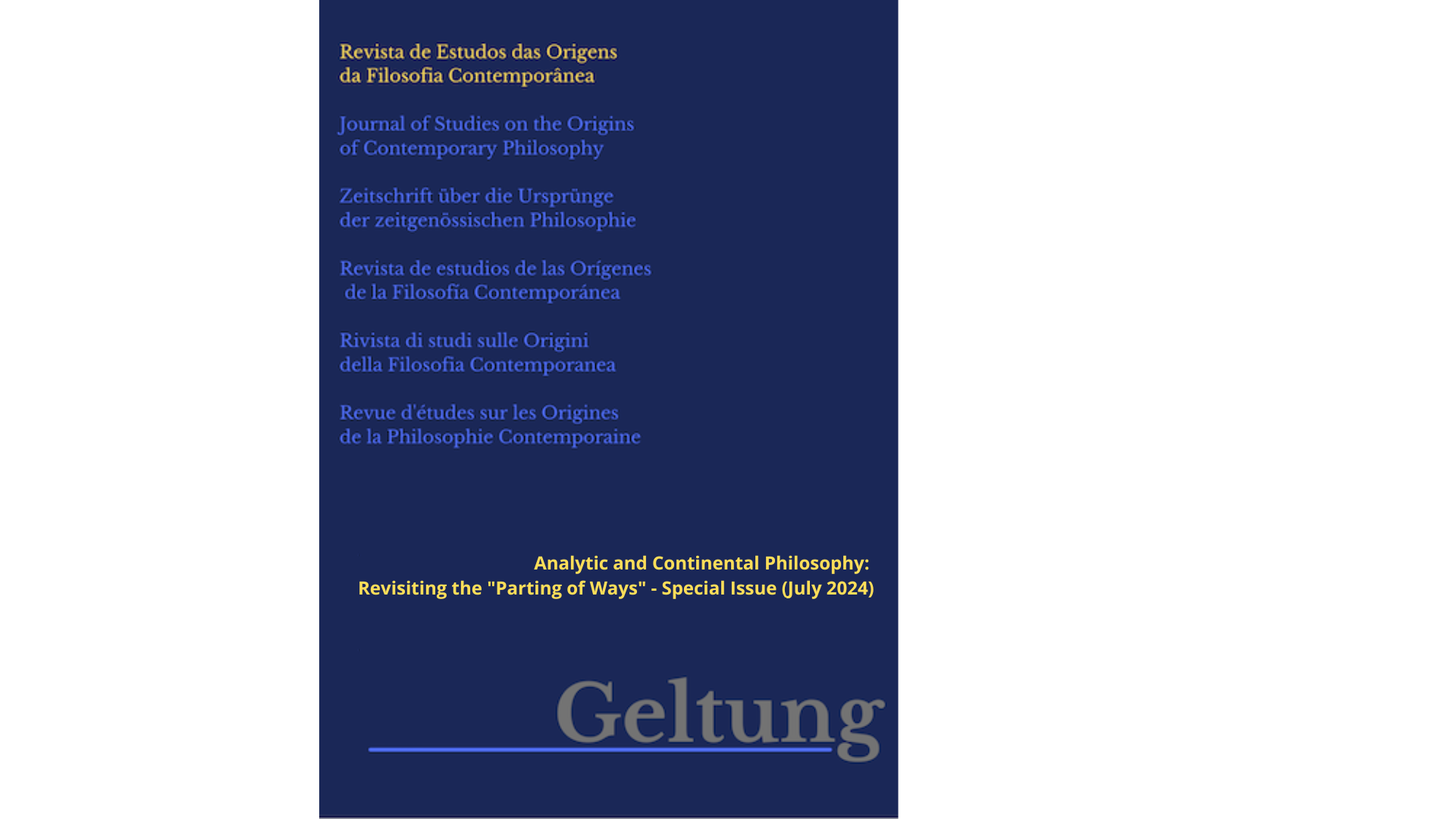Reformulando alianças históricas
Reduzindo a importância da divergência de Frege em relação à filosofia de Kant
DOI:
https://doi.org/10.23925/2764-0892.2024.v2.n2.e64793Palavras-chave:
Juízo, Fundacionalismo cognitivo, Anticeticismo, InferencialismoResumo
Argumentamos que o recente debate sobre o significado e a identificação de conteúdo levou a uma mudança nas circunstâncias teóricas que favoreceram a divergência de Frege em relação a Kant. A crítica de Quine à distinção teórica das identidades intensionais removeu a certeza de que podemos distinguir identificações necessárias de acidentais de conteúdo. O declínio da estabilidade da linguagem como objeto central para o estudo de atributos reconhecíveis e predeterminados de informação significativa marca o fim da era do otimismo filosófico sobre a superioridade da análise da linguagem em relação ao psicologismo e leva a um ressurgimento da ênfase filosófica no estudo da mente e da cognição. A extensão dessa mudança é tal que a discrepância central entre a metodologia formal de quantificação de segunda ordem de Frege e a teoria sintética de identificação de conteúdo de Kant perdeu sua importância. Com a remoção dessas circunstâncias e a erosão dessa discrepância, podemos agora perceber os aspectos em que a teoria de Frege é consistente com, em vez de diretamente oposta a, a perspectiva cognitiva que o próprio Kant endossa. Esses aspectos sempre estiveram presentes, mas sob condições desfavoráveis foram suprimidos ou desconsiderados.
Referências
BAR-ELLI, Gilead. Three Kantian Strands in Frege’s View of Arithmetic. Journal for the History of Analytical Philosophy 2 (7), 2014.
BRANDOM, Robert. Making It Explicit: Reasoning, Representing, and Discursive Commitment. Cambridge, Mass.: Harvard University Press, 1994.
CARNAP, Rudolf. Empiricism, Semantics, and Ontology, Chicago: University of Chicago Press, 1956, pp. 205–221.
DUMMETT, Michael. The Philosophical Basis of Intuitionistic Logic. In Truth and Other Enigmas. Cambridge: Harvard UP, 1974, pp. 215--247.
DUMMETT, Michael. The logical basis of metaphysics. Cambridge, Mass.: Harvard University Press, 1991.
FREGE, Gottlob. Begriffsschrift, eine der arithmetischen nachgebildete Formelsprache des reinen Denkens (BS), in Frege, Gottlob (1964) Begriffsschrift und andere Aufsätze. Edited by I. Angelelli. Hildesheim: Georg Olms, (1879) 1964, pp. 1–88.
FREGE, Gottlob. Sense and reference. Philosophical Review 57 (3), 1948, 209-230.
FREGE, Gottlob. Function and Concept. translation by P. Geach in Geach and Black, 1960, pp. 21-41.
FREGE, Gottlob. The Foundations of Arithmetic. Evanston: Northwestern University Press, 1950.
FREGE, Gotlob. The Thought. Mind, 65(259), 1956, pp. 289–311.
FREGE, Gotlob. Diary entries on the concept of numbers. In Frege, 1979, pp. 263–64.
FREGE, Gotlob. (1924b). Number. In Frege, 1979, pp. 265–66.
FREGE, Gottlob. 'Boole's Logical Calculus and the Concept-Script' (1880-1881), Posthumous Writings. Edited by Hermes, et al. (Blackwell), 1979.
GEACH, Peter. Assertion, The Philosophical Review 74 (4), 1965, pp. 449–465.
GOLDMAN, Alvin I. Epistemology and cognition. Cambridge, Mass.: Harvard University Press, 1986.
HUSSERL, Edmund. Logical Investigations Volume 1. New York: Routledge. Edited by Dermot Moran., 2001.
KANT, Immanuel. Guyer, Paul & Wood, Allen W. (eds.). Critique of Pure Reason. Cambridge University Press, 1998.
KANT, Immanuel. Trans. Guyer, P., & Matthews, E. Critique of the Power of Judgment. Cambridge University Press, 2000.
KANT, Immanuel. Prolegomena to Any Future Metaphysics, translated and edited by Gary Hatfield, revised edition. Cambridge: Cambridge University Press, 2004.
KlEMENT, Kevin C. Higher-Order Metaphysics in Frege and Russell. In Peter Fritz & Nicholas Jones (eds.), Higher-Order Metaphysics. Oxford: Oxford University Press, forthcoming.
MARTIN-LOF, P. “An intuitionistic theory of types: Predicative part”, in Logic colloquium ’73, H.E. Rose and J. Shepherdson (eds), Amsterdam: North-Holland, 1975, pp. 73–118.
MARTIN-LOF, P. Truth of a proposition, evidence of a judgement, validity of a proof. Synthese 73, 1987, 407–420.
QUINE, W. V. O. Two Domgas of Empiricism. From a Logical Point of View, Cambridge, Mass.: Harvard University Press,1953, 20 - 46.
QUINE, W.V.O. Epistemology Naturalized. Ontological Relativity and Other Essays. New York: Columbia University Press, 1969.
RYLE, Gilber. Systematically misleading Expressions, Proceedings of the Aristotelian Society, Volume 32, Issue 1, 1, 1932, pp. 139–170,
SCHANG, Fabien. How to Hintikkize a Frege. In Amirouche Moktefi, Alessio Moretti & Fabien Schang (eds.), Let’s be Logical (Studies in the Philosophy and History of Logic). Londres, Royaume-Uni: 2016, pp. 161-172.
STALNAKER, Robert. (2007). Critical Notice of Scott Soames’s Case against Two-Dimensionalism. The Philosophical Review, 116(2), 2007, pp. 251–266.
SULLIVAN, P. M. ‘Frege’s Logic’, in Gabbay D. M., Woods J. (eds.), Handbook of the History of Logic, 3, Elsevier BV, 2004, 659-750
SUNDHOLM, G. “Inference versus consequence” revisited: inference, consequence, conditional, implication. Synthese, 187(3), 2012, 943–956.
Downloads
Publicado
Como Citar
Edição
Seção
Licença
Copyright (c) 2024 Geltung, revista de estudos das origens da filosofia contemporânea

Este trabalho está licenciado sob uma licença Creative Commons Attribution 4.0 International License.








